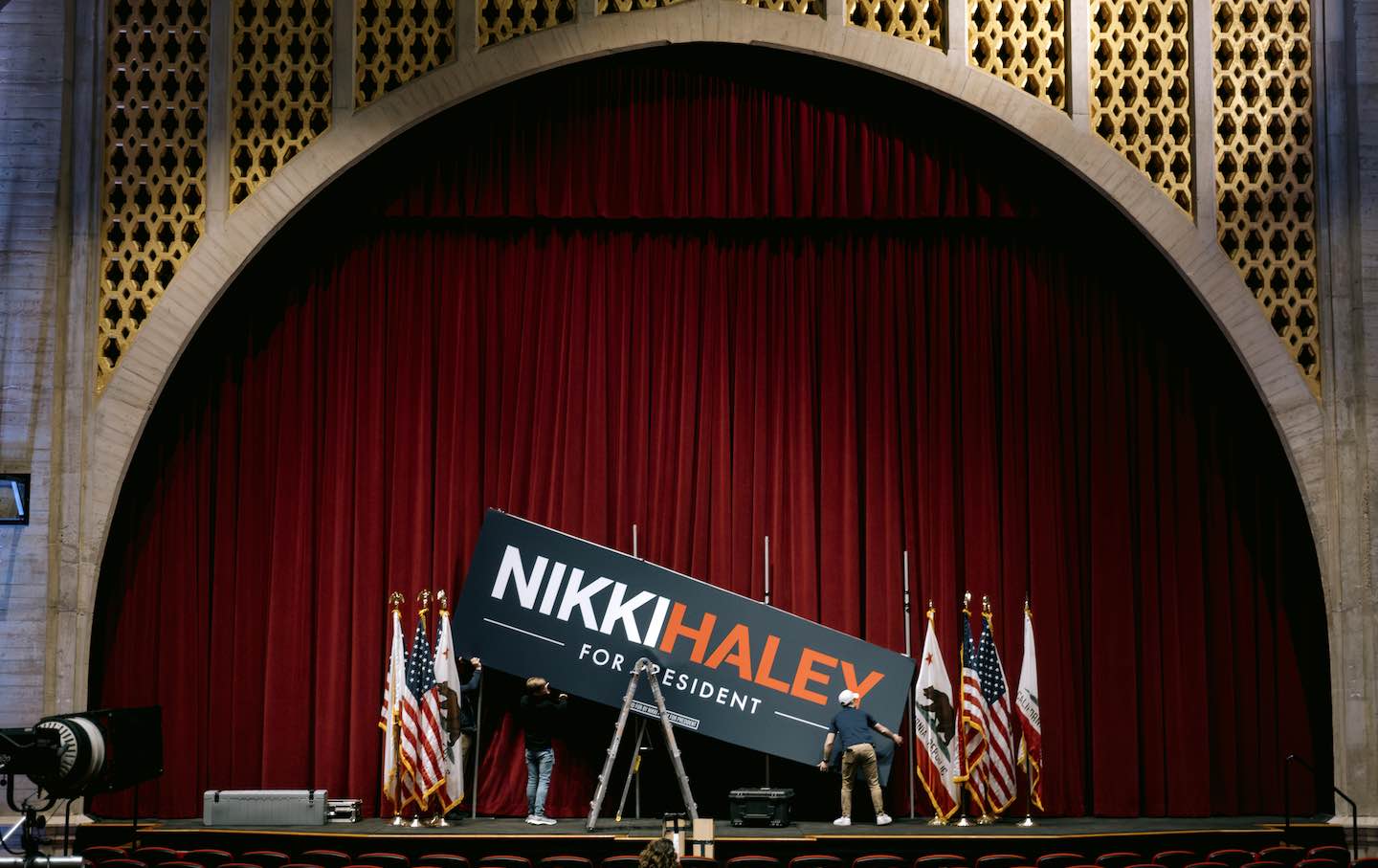Nikki Haley’s Big Flop
Trump’s only remaining Republican opponent lost in the Nevada primary to the ballot option for “None of these candidates.”

Workers remove a sign following a campaign event with Nikki Haley, former governor of South Carolina and 2024 Republican presidential candidate, not pictured, at Hollywood American Legion Post 43 in Los Angeles on Wednesday, Feb. 7, 2024.
(Mark Abramson / Bloomberg)In a race with no opponents, and in a contest with no convention delegates at stake, Nikki Haley, the lone surviving challenger to Donald Trump in the Republican nominating process, lost Tuesday’s Nevada primary in a landslide.
As explained in an earlier column, Nevada’s state legislature mandated a couple years back that primaries be held in the presidential nominating process. The GOP responded by announcing that it would hold a caucus as well, setting ground rules that candidates could enter one or the other contest, but not both—though voters could vote in both contests—and that only the caucus results would count for accruing delegates. Trump, of course, promptly chose to enter the caucus, a format that he thrives in; Haley opted to go forgo the delegates and went for the hoped-for headlines of a big symbolic win in the primaries. It didn’t work. On Tuesday, she secured less than one-third of the primary vote, with almost all of the rest of the vote going for “None of these candidates.” The headlines weren’t exactly adulatory toward Haley. Two days later, Trump easily won the caucus.
So much for Haley’s thorn-in-Trump’s-side strategy, a strategy intended to chip away at Trump’s margins, while he threw one tantrum after another, eventually leaving the South Carolinian as the adult-in-the-room alternative to the aging, preening bully. After months in which Haley (along with the hapless Ron DeSantis) passed up the myriad opportunities available to craft a cogent narrative of Trump’s criminal unfitness for office, her belated pivot onto a more aggressive footing against the twice-impeached, four-times-indicted ex-president has been too little too late. If Haley’s strategy had proved effective, Nevada’s primary, in which she was essentially running unopposed, would have been her debutante’s ball; instead, it was a fiasco.
Coming during a week in which Trump intimidated congressional Republicans into tanking the first relatively bipartisan border security and immigration reform legislation in decades, and pressured House leaders to go through with an impeachment vote against the secretary for Homeland Security that they did not have the numbers to win, the Nevada results showed just how subservient the GOP is to Trump and his erratic personal whims. This is no longer in any meaningful sense a broad-tent political party; it is a vehicle commandeered by one autocratic leader and his henchmen. Like any vehicle driven by a wrathful madman, this one is a wreck waiting to happen.
Scroll down the news feeds these days, and virtually every political story has something to do with Trump—be it his primary victories, his campaign speeches, or his cascading legal travails. Read these headlines, and 2024 is a one-man show.
Yet, in a low-key way, President Biden is stamping his mark on the primary process at least as effectively as Trump. In Tuesday’s Nevada primary, roughly 70,000 Republicans cast votes; on the Democratic side, however, despite Biden’s only opposition being Marianne Williamson, who had less than a snowball’s chance in hell of eating into the president’s margins, more than 120,000 residents cast their ballots, with upwards of 112,000 of those votes going to Joe Biden. That’s a pretty impressive voter turnout operation for an election whose result was a foregone conclusion.
Still, I worry. One of the most corrosive effects of the country’s increasingly acrimonious politics and its increasingly dysfunctional, clickbait-driven media systems has been that vast numbers of young people, in particular, are simply tuning out of the process—or, as in the case of one young Nevadan I interviewed last month, are voting not for who they think is the better person but for who they think offers the most entertainment potential. (Spoiler alert: Trump scores big on that measure.) Taught only the rudiments of civics in high school, many of them having come of age in a pandemic world in which their schools were shuttered for more than a year, a vast pool of voters no longer see the point in political awareness or participation, or, more generally, in following the major news events of the moment.
I have, in recent weeks, encountered university students who know so little about the politics of the country that they think that Trump is being challenged in the GOP primaries by Joe Biden; who can’t name their own state’s governor or senators; who have no idea when their own state primary vote is; who don’t know even the most elementary details of the felony charges leveled against Trump; who, when asked, think that Russia has been at war with Germany, rather than Ukraine, for the past two years; and who think that the US recently bombed Israel in response to Houthi attacks in the Red Sea. Many of those same young people are convinced that the US unemployment rate is in double digits, rather than the 3.7 percent it really is. After all, they have read on social media that the economy is in terrifyingly bad straits, and therefore it must be so.
There is, these days, a frightening lack of media literacy—there’s no requirement for media literacy education in high school or in universities, though there clearly should be—and, increasingly, a chronic inability to digest the news and distinguish what is important from what is frivolous. At an airport in California a few months back, I was standing in line to board the plane and reading a physical newspaper while I waited. The woman behind me looked at it and then said to me in wonder, “I didn’t know they still made those.”
The answer is, yes, “they” still do “make” newspapers, but, increasingly, people are reading neither paper versions nor their digital counterparts, and, increasingly, faced with a financial squeeze, newspapers are employing fewer and fewer journalists to put out the news. Last month, for example, the Los Angeles Times dispensed with nearly a quarter of its reporters.
With the American news ecosystem so damaged, audiences are instead getting their take on the world from rumor mills and social-media sites, flooded with misleading imagery sometimes generated by AI, that go out of their way to avoid responsibility for distributing inaccurate information. In such a fractured media environment, demagogic men like Trump thrive.
Joe Biden may have shown his muscle in the Democratic primary in Nevada this week—and more power to him for so doing. But that’s a far different proposition from engaging and animating independents, the apolitical, and the disaffected; from convincing young people to pay attention to electoral politics; and from enthusing potential voters who just want to be entertained, shock jock–style, in the fewer than nine months leading up to the November election.
More from The Nation

What Comes After the Apocalypse? A Q&A With Joshua Oppenheimer What Comes After the Apocalypse? A Q&A With Joshua Oppenheimer
Oppenheimer’s latest film, The End, is a Golden Age, postapocalyptic musical crying out from the depths of the earth.

What Luigi Mangione and Daniel Penny Are Telling Us About America What Luigi Mangione and Daniel Penny Are Telling Us About America
When social structures corrode, as they are doing now, they trigger desperate deeds like Mangione’s, and rightist vigilantes like Penny.

Donald Trump Is the Authentic American Berserk Donald Trump Is the Authentic American Berserk
Far from being an alien interloper, the incoming president draws from homegrown authoritarianism.

Banning Trans Health Care Puts Young People at Risk of Harm Banning Trans Health Care Puts Young People at Risk of Harm
Contrary to what conservative lawmakers argue, the Supreme Court will increase risks by upholding state bans on gender-affirming care.




